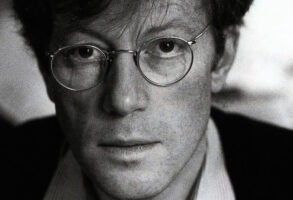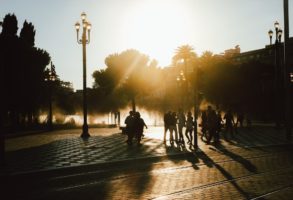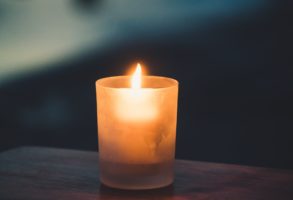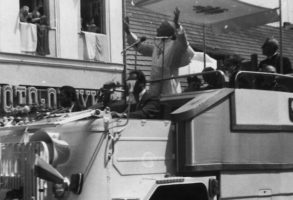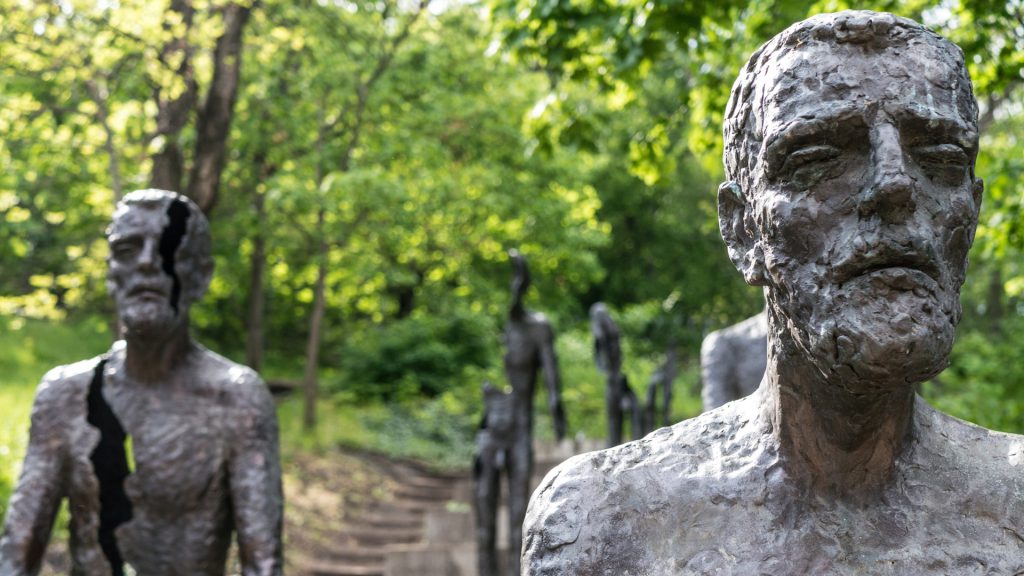
Published June 30, 2019
This article originally appeared under the headline “Sir Roger Scruton battled the Thought Police behind the Iron Curtain as a young man. Now he says they’ve come for him in Britain after he was wrongly accused of making racist slurs.”
In 1979, when teaching philosophy at the University of London, I responded to an invitation to address a private seminar in Prague. I travelled from Poland, already inwardly frozen by the eerie chill of Communism – and Communist Prague did nothing to raise my spirits.
I walked to the address I’d been given through deserted streets. The staircase of the apartment building was also deserted. Everywhere the same expectant silence hung in the air, as when an air raid has been announced, and the town hides from its imminent destruction.
Outside the apartment, I encountered two policemen, who seized me as I rang the bell and demanded my papers. My host came out and an altercation ensued, during which I was thrown down the stairs. But the argument continued and I was able to duck past the guard and into the apartment.
I found a room full of people and the same expectant silence. I realised that there really was going to be an air raid and that, in a manner of speaking, the air raid was me.
In that room was a battered remnant of Prague’s intelligentsia – old professors in shabby waistcoats; long-haired poets; fresh-faced students who had been denied admission to university for their parents’ political ‘crimes’; priests in plain clothes; novelists, theologians, a would-be rabbi, and even a psychoanalyst.
And in all of them I saw the same marks of suffering and the same eager desire for the sign that someone cared enough to help them.
They all belonged, I discovered, to one profession: that of stoker. Some stoked boilers in hospitals; others in apartment blocks; one stoked at a railway station, another in a school. Some stoked where there were no boilers to stoke, and these imaginary boilers came to be, for me, a fitting symbol of the Communist economy.
This was my first encounter with ‘dissidents’, and I felt an immediate affinity. Nothing was of such importance for them as the survival of their national culture.
Deprived of material and professional advancement, they were forbidden to publish or to travel. The authorities had concealed their existence from the world and had resolved to remove their traces from the book of history.
How had this situation arisen, I asked, and I was flabbergasted by the answer. These people, who included some of the most distinguished teachers of their generation, had been condemned to menial employment, either because they had signed Charter 77, which called on their government to respect citizens’ rights, or because they had refused to denounce a colleague for doing the same. (The founding members of Charter 77 included Vaclav Havel, who would later became president when Czechoslovakia was freed from Soviet control.)
Some of the young people had been expelled from university for organising reading groups. Others had been punished as members of the ‘imperialist Zionist conspiracy’ (a codename for the Western alliance but with a nice hint of anti-Semitism along the way) and so had been removed from their posts following a campaign of vilification in the national press.
In short, I was addressing a room of criminals whose ‘crimes’ consisted of uttering the wrong word, reading the wrong book, belonging to the wrong network, and in general trusting in the free life of the mind. Does this sound familiar? Then read on…
Other free-thinking academics had experiences like mine in Prague and – now safely back in London – we got together to set up a charity devoted to the cause of free education in Czechoslovakia, supporting seminars to which Western scholars, artists and intellectuals could bring their knowledge and expertise.
To me this was the most exciting of adventures, though one that caused much alarm whenever one of our contacts was arrested.
Things took a great step forward when I met Jiri Muller in Brno, a city in what is now the south-east corner of the Czech Republic.
Few people knew of Jiri. A foreman in a fire extinguisher factory who had spent five years in jail for subversion of the republic, he worked intently and secretly for the liberation of his country and the restoration of a democratic rule of law.
It was through a secret network of contacts, with Jiri at its centre, that official academics could consult and advise their underground colleagues, that official ecologists could exchange research with their excluded counterparts, and that judges could give advice to victims of The Party.
It was through Jiri that artists, writers and musicians could form links to the West and experts offer their knowledge to the anti-Communist cause.
Yet Jiri himself was always hidden. Few of those he brought together would meet him and fewer still knew the extent of what he did. For good reasons, he trusted almost no one.
I was able to meet him only because a message had been sent to him from someone he trusted telling him to be at a certain street corner in Brno at a certain time.
We had been warned against Brno – even the trees in the park, they said, were bugged, and the police were in total control.
I walked up to the man I assumed was Jiri, who looked at me in silence for a long time before beckoning and walking away.
I followed, conscious of those trees that listened out for us.
Only when we stood together in his kitchen did he turn to address me, reeling off a list of necessities: tapes to record the true story of Czech literature from a dissident professor, which could then be distributed through the schools. He wanted to draw visitors for the Brno theatre. He needed help for an important dissident sculptor, Bibles for a Lutheran church, yarmulke skull caps and other sacred objects for a secret synagogue…
We were to join him in the task of perpetuating Czech society and culture in defiance of the secret police. It was a wonderful vision –and who would not give himself to it, heart and soul, when told that there would be no reward beside the danger?
Continuing to live in London, I now started travelling to Czechoslovakia for a few days at a time to help manage the network. We imitated Jiri’s methods as best we could, and the result was, I think, a creditable attempt at an underground university, with samizdat (or underground) publications, book smuggling, structured courses on important subjects, and even examinations leading to a degree conferred by the Divinity School of the University of Cambridge.
For cover, we depended on one or two ‘high-profile’ seminars, run by people brave enough and well-enough known to operate under the nose of the secret police.
From time to time, these seminars would be raided and sometimes our visitors, too, would be arrested and even detained for a night or two. But the fuss these seminars created enabled us to establish genuinely secret courses in Prague, Brno and Bratislava. Our goal was the one that Jiri had taught us: to pass on the knowledge and the culture that the official universities had suppressed.
We furnished the students with books and materials and briefed our visitors to take up each topic at the point where it had been left. We offered courses in philosophy, Hebrew, history, musicology, classical architecture, fine art, theatre and anything else asked for. We supported a circle of composers in Brno as well as artists and sculptors who had lost the right to exhibit their work. Everywhere we were met by grateful people prepared to take the risk of meeting us purely for the sake of knowledge.
At first, as a marginalised conservative, I was surprised by the support we had from colleagues in Britain and France. Not only were they prepared to risk arrest, deportation or worse, all political differences were set aside in the desire to co-operate in the pursuit of knowledge. Whether Left, Right or Centre, our colleagues wished only to teach what they knew to people eager to learn from them.
I had known I’d be arrested from the look given to me by the girl at the embassy when I applied for my visa in London and so, on what would prove to be my final mission, I took a devious route into Czechoslovakia, via Vienna.
It bought me enough time to meet Jiri. And one summer’s day in 1985, as we stood in the park in Brno staring at one of those listening trees, the tree changed into the slick young secret policeman concealed behind it.
His attempts to arrest me were bravely countered by Jiri, who argued that we must first return to his house to collect my belongings.
After a hectic chase in Jiri’s belching Trabant, pursued by a fleet of Mercedes, we crashed through the door of his little house and down to the bathroom, where, one by one, Jiri swallowed the bits of paper I had brought him from England.
By the time I was delivered to the authorities, not a trace remained of the messages that I had come to deliver. I was questioned for a few hours and strip-searched, but got off lightly in the circumstances.
I ended up that night in a border village in Austria, looking back wistfully towards the Jewish cemetery in Mikulov, where Jiri and I had been allowed to exchange a few last words before I was deported.
After this, our co-operation took on a new form. I never thought that I should see my friends again. Still less did I imagine I should one day witness them occupying the highest political offices in their country. But I was determined that our work should continue and so communicated with Jiri through letters, parcels and computer disks taken by messenger. I learned to read the language and became familiar with the wonderful cultural heritage of Bohemia and Moravia.
I became a Czech patriot at the very moment when I had become an official enemy of the Czechoslovak state.
I waited anxiously for news of my adopted brothers and sisters and passed sleepless nights should I learn that one of them had been arrested. This strange situation changed my character – I hope for the better.
At any rate, it caused me to think long and hard about Europe and its destiny, about Communism and about the human soul, which seems to live on in secret, even when its very existence has been denied as it was denied by Communism. In the Czech lands, I sensed the presence all around me of a dark, impersonal force, a controlling and all-observing eye whose goal was to plant suspicion and fear in the heart of every human relationship.
You could trace this force to no specific person, to no office or authority. It was just there, an invisible wall between all who sought to escape.
I had no name for this dark force, other than ‘It’ – a kind of negation of humanity. From behind the first stirrings of friendship or love, It lay in wait to reduce the flame to ashes. Always, when I stepped on the plane home, I felt I was escaping the grip of this alien force, and returning to a place where fear, suspicion and denunciation had no power over ordinary human decency.
Later, after the fall of the Berlin Wall, we took pride in the alumni of our university, among whom were the Czech and the Slovak prime ministers of the day.
In comparison with the dark cloud of denunciation which was all that the impersonal machine of Communism could produce by way of a university, we had created a pool of light in which we could converse in freedom. This was a sign of the virtue of my country, too: without the British sense of fair play and free enquiry, we would never have pursued so quixotic a cause.
Yet, how different things are today. Round-robins of denunciation now circulate in our universities accusing one scholar after another of the wrong word, the wrong associations, the wrong ‘ism’ or ‘phobia’ from the list of favourite thought-crimes, as with the case of Professor John Finnis in Oxford, accused of homophobia, or Noah Carl at St Edmund’s College Cambridge, smeared as a racist.
Their cases bring uncannily to mind those official documents our Czech colleagues were called upon to sign which denounced this or that innocent person for his part in the international Zionist conspiracy.
The witch-hunting hysteria has returned with a vengeance, not in Eastern Europe but here, where open enquiry and the presumption of innocence have been, until this moment, the foundation of moral order and the guarantee of civil peace.
Even the Divinity School at Cambridge, which once bravely helped us in offering degrees to our students, has joined in the witch-hunt, revoking a fellowship offered to the conservative thinker Jordan Peterson in response to a petition littered with the signatures of ignorant snowflakes.
And when, just a few months ago, I was summarily removed as the (unpaid) head of a Government quango – Building Better, Building Beautiful – for things I had neither thought nor said, my Czech colleagues said: ‘Yes, it is starting again.’ And by ‘it’ they really did mean It.
Now in Britain, as then in Czechoslovakia, the true intellectual is a dissident, and if our national memory is to survive, it will be because we have succeeded in building here, as once we built there, an underground university devoted to knowledge.
Sir Roger Scruton is a senior fellow at the Ethics and Public Policy Center.

